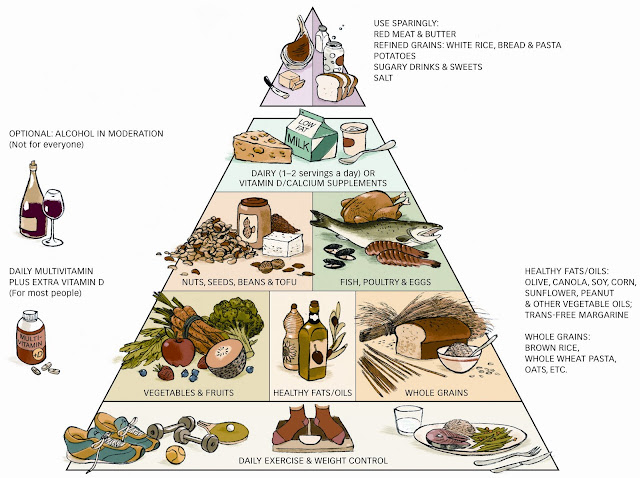During our conversation about healthy food/cooking, the first thing out of his mouth was this: "Healthy food should be low-calorie." My response to this was: "I don't count calories; it would drive me batty. I focus on portion-size & nutritional content, & then if I exercise regularly to match my input (for weight maintenance), everything seems to work out just fine. To me, healthy food is whole food that's high in nutrients, & low in fat & sugar." He's probably going to be slightly pissed off at me for mentioning this, but he already knows that he also eats a lot more processed food than I do, and as far as I know, still drinks soda, which I don't do and never really have. Please understand, I'm not saying this to be a judgmental goody-two-shoes, but rather to show how our thoughts & corresponding behaviors clearly illustrate a fundamental difference in our approaches to food & healthy eating, and what's most important to us as individuals.
[Right now, several of my male friends are probably wondering if I'm really referring to them (Haha!), but the person I'm actually referring to already knows who he is, because this conversation happened fairly recently & the minimal details I've just mentioned are clearly too specific to be overlooked or confused with any other recent conversation or person. :) As I didn't want to embarrass this person, you'll notice there's no name mentioned. Furthermore, our friendship is strong enough to withstand the honesty; otherwise, I never would've mentioned it in the first place. Plus, he's tough enough to handle it. I'm happy to say that we are mature enough to be OK with the other person having differences of opinion & behaviors, and can still be friends after discussions like these. We have enough of a bond to make that bare (& sometimes rather unsparing!) honesty work. Please note that there are no cruel intentions behind my words, nor are they intended to do harm, only to point out the facts of the situation. I try to be as tactful as possible, although I'm not sure I succeeded in the above case. ;) When it comes right down to it, truly good friends don't BS each other or pull any punches, & we clearly have an unspoken understanding -- i.e., a "no BS" policy -- in our friendship. :) ]
Likewise, we tend to go by the European model of grocery shopping -- buying on a daily or semi-weekly basis, & picking what's fresh & in season. That's what my maman did when I lived abroad, & I saw from her example how effective & smart that approach really was. She walked to her local market almost every single day (which is of course good exercise to boot!) to buy fresh ingredients for that night's supper. And, yes, when given the opportunity to buy local, I like to support our local farms, particularly the organic ones.
As many of you know from watching the slew of green programs on TV, or reading books & watching documentaries on the subject (like Food, Inc., which IMHO, is one of the most important films of the last decade), our food is a LOT less healthier than it was even 50 years ago. Think about that for a second. In the last 50 years, the food industry did more to undo food standards/regulations & quality control than in the last few centuries of food production. And that is anything but a good thing for the health & safety of the average citizen. The number of chemical additives in our food as well as the number of shortcuts that the food industry has implemented in the name of so-called "convenience" has gone up by an alarming rate.

 The good news is that we have freedom of choice: We can choose what we eat. And we still have the power to vote with our dollars and send the message that we will not stand for crappy food anymore, and instead will choose to endorse products which truly serve our own best interests in the name of health & our children's health. Mass manufacturers CAN do better. They just need a kick where it hurts to get them going.
The good news is that we have freedom of choice: We can choose what we eat. And we still have the power to vote with our dollars and send the message that we will not stand for crappy food anymore, and instead will choose to endorse products which truly serve our own best interests in the name of health & our children's health. Mass manufacturers CAN do better. They just need a kick where it hurts to get them going.Related Site
-easyrecipesofchicken
-recipesoffoodanddrink
Related Videos :below I show related videos and not so related to this article.
Absolute Definition Sano\ Michael Scipione \ Healthy Cooking \ Crab Corn and Avacado Salad
As part of the celebration of National Afro Day, The Nappturalite Radio Show spotlighted the Entwine Naturalle Couture products. Listen to the full product review, learn tips and the natural ladies of Nappturalite's experience when they 'Emerged into the Couture'.
Here the full show at: http://www.blogtalkradio.com/nappturalite
Learn More. Get Results. Live the Couture.
http://www.EntwineCouture.com/
http://www.Facebook.com/EntwineCouture
http://www.Twitter.com/EntwineCouture
Entwine™ is the premiere line of salon-inspired, ultra-quality hair care and styling alternatives that brings a haute-couture approach to natural and transitioning hair care and styling.
This designer collection features custom-made and artfully crafted formulas blended with rich exotic butters, pristine natural oils and luxurious conditioners that are finessed with 'real-world' holistic technology to enhance the healthy, beauty, and manageability of naturally curly, wavy, kinkly, coarse to fine and transitioning hair.
The Naturalle Coiffure Collezioni consists of:
• "The Manipulator" Crème Jellé Styler- The Ultimate Natural Hair Style-, A flexible, re-definable styling crème-gel used to create long-lasting natural styles with no heavy build-up, flaking or hardness.
o Use to flat twist, two-strand twist, braid, wash-n-go, fingerstyle, flat iron or quick-sets
• "Indulgently Luxe" Exotique Butter Crème Hydrator- a daily moisturizing and conditioning crème featuring a custom Balsamic Butter-Oyl Blend™ of natural butters and oils with luxurious conditioner that hydrates and softens the driest natural hair.
o Apply prior to blow-drying hair to protect and moisturize or use to soften and moisturize all natural hair textures, twist outs, braid styles.
• "On the Edge" Crème De La Mold- A powerful holding and molding mud featuring Micro-Fibrous Holding Technology that provides long-lasting smoothing, molding and holding power with no flaking, tackiness or excessive buildup on natural, transitioning and loc'ed hair.
o Use to hold edges, smooth the nape of the neck or to mold the hair. Also use for loc formation and maintenance.
• "Total Perfection" Moroccan Argan Oil- 100% Raw and Vegan, this rare, organically grown oil provides ultra-hydration, true protection and sensual shine to the hair, skin and nails.
Questions Comments
+1.888.700.0108
www.EntwineCouture.com
livethecouture@entwinecouture.com














0 comments:
Post a Comment